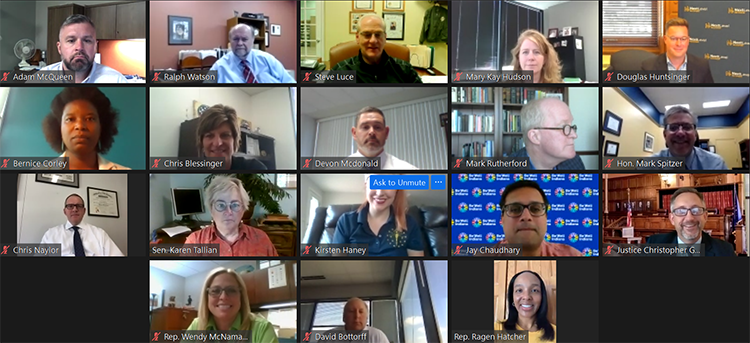By Jenny Bauer, Staff Attorney | Office of Court Services

An important part of Indiana’s criminal code reform was the General Assembly’s creation of the Justice Reinvestment Advisory Council in 2015. The original nine members of the Council included leaders from the executive and judicial branches of government as well as leaders from the community corrections and probation officer professional associations. The Council was charged with conducting state-level reviews of local corrections programs, county jails and probation services, and the processes used by the Department of Correction and Division of Mental Health and Addiction in awarding grant funding for community supervision agencies and the Recovery Works forensic addiction and mental health treatment program.
The original goal of the Council was to develop incarceration alternatives and recidivism reduction programs at county and community levels by promoting the development of probation services, problem-solving courts, mental health and substance abuse treatment, court supervision programs, probation, pretrial diversion, community corrections, evidence-based recidivism reduction programs for incarcerated persons, and other alternatives to incarceration.
Between 2015 and 2019, the Council provided an important collective voice on issues such as criminal justice data collection and funding, jail overcrowding, bail reform, and the local impact of criminal code reform. The Council proposed legislation, regularly testified before House and Senate Committees, and created partnerships with the Management and Performance Hub and the Evidence Based Decision Making Initiative. The Council’s work—and even its membership—overlapped with the Jail Overcrowding Task Force and the EBDM State Policy Team.
This overlap was recognized by legislators in the 2020 session of the General Assembly. The General Assembly amended the Council statute to add eight new members and significantly increase the Council’s purpose and duties. The 18-member Council now includes members from the executive, legislative, and judicial branches of state and local government with new representatives from the Governor’s Office, the Indiana House of Representatives and Senate, the Indiana Judges Association, the Association of Indiana Counties, and the Indiana Public Defender Commission. Chief Justice Loretta Rush appointed Justice Christopher Goff as Council chair, and the Office of Judicial Administration continues to provide staff support to the Council.
The Council’s statutory duties and purposes were greatly expanded to incorporate the work of the JOTF and EBDM. The Council now has six official duties:
- Review and evaluate state and local criminal justice systems and corrections programs, including pretrial services, behavioral health treatment and recovery services, community corrections, county jails, parole, and probation services
- Review the processes used by the Department of Correction and the Division of Mental Health and Addiction in awarding grants
- Review and evaluate jail overcrowding to identify a range of possible solutions
- Coordinate with other criminal justice funding sources
- Establish committees to inform the work of the advisory council
- Perform other relevant duties as determined by the advisory council

The Council’s purposes were also revised to review policies, promote state and local collaboration, and provide assistance with evidence-based practices and best practices in community-based alternatives and recidivism reduction programs, including: (1) probation services; (2) problem-solving courts; (3) mental health and addiction treatment and recovery services; (4) pretrial diversion programs; (5) community corrections; (6) evidence-based recidivism reduction programs for currently incarcerated persons; (7) other rehabilitation alternatives; and (8) the incorporation of evidence-based decision making into decisions concerning jail overcrowding.
The new and improved Council hit the ground running in the midst of the coronavirus pandemic. The Council conducted its June, August, September, and October meetings by video conference, with a live stream available to the public. The Council plans to conduct scheduled meetings in 2021 the same way. The Council posts archived meeting videos (with closed captioning) and documents on the Council’s website.
Under the leadership of Justice Goff, the Council created the Quick Response Workgroup to focus on racial equity issues, jail population case studies, legislative proposals, and funding recommendations. The Council plans to use the recommendations from the Jail Overcrowding Task Force and Bail Reform reports as a roadmap for consensus and action in the coming months. The Council is energized to meet the challenges ahead.